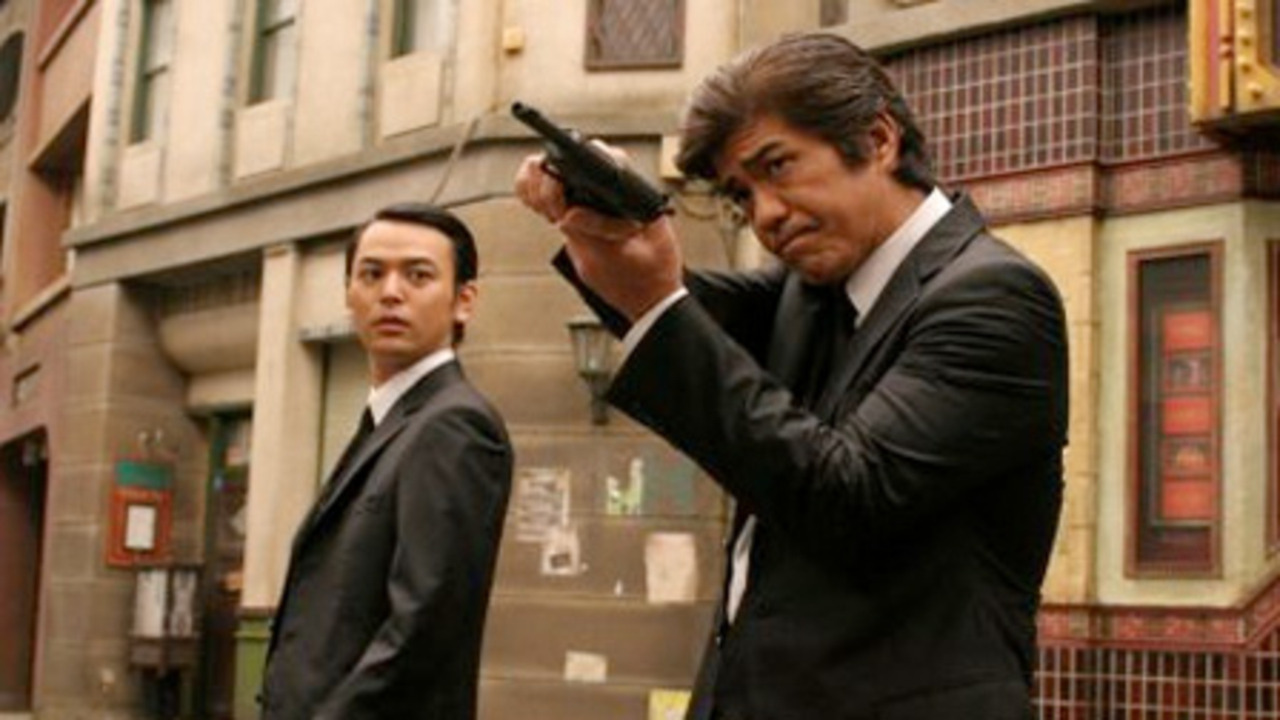By Chlotrudis Independent Film Society
Rating: 4.5 cats
Director: Kôki Mitani
Starring: Eri Fukatsu | Haruka Ayase | Kôichi Satô | Satoshi Tsumabuki | Toshiyuki Nishida

Original language title: Za majikku awâ
Country: japan
Year: 2009
Running time: 136
IMDB: http://www.imdb.com/title/tt1077089/
Jason says: “Let’s face it: The whole deal with gangs and movies intersecting in such a way as to cause hilarious, self-referential misunderstanding is pretty darn played out. I groaned a little just reading the description for THE MAGIC HOUR, seeing that it would be working that territory. We’ve seen it all before, or at least it seems that way. I don’t know if Koki Mitani has exactly found a new angle on it, but he’s certainly found indications that there’s a little life at this particular genre crossroads yet.
“The film opens in classic style, as a carload full of goons bursts into the Minato Hotel, where club manager Bingo (Satoshi Sumabuki) is making time with the Boss’s girlfriend Mari (Eri Fukatsu). In no time flat, Bingo and Mari are being fitted for cement shoes, but Bingo overhears the gangsters talking about trying to locate a mysterious assassin, Della Togashi. Saying he can find the killer gains him a five-day reprieve, but Bingo has no idea where to look. Fortunately, nobody knows what Togashi looks like, so Bingo hits upon the idea of hiring Taiki Murata (Koichi Sato), an actor with the right look but a career spent more in stunt work than acting, and telling him that he’s playing hitman Della Togashi in a mostly-improvised movie. Employees Natsuko (Haruka Ayase) and Takashi (Goro Ibuki) help sell the illusion, which works a bit too well – Boss Tessio (Toshiyuki Nishida) wants to hire him.
“This is a plot that generally requires at least one character to not be so bright, and for the most part, that falls to Koichi Sato’s Murata. Murata is not a great thespian, but Sato plays him as a specific type of bad actor: A little too well-aware of where the camera is (or should be), trying to pick up more screen time by impressing the director with what he brings to the table, even though it’s not all that great. It works in part because Murata is actually competent at some things, so when we watch him misinterpret what’s going on at every step, he never actually does something foolish enough that we find it impossible for him not to get caught out, but it’s funny because it is so ridiculous.
“Even with that, Mitani’s script does rely heavily on everything working out just right: Tessio or his lieutenant Kurokawa (Susumu Terajima) will almost always say or do something that works perfectly as a lead-in for Murata, nobody will get hit by a stray bullet and kill the mood, etc. Mitani manages this by doing a couple of things. First, and most important, he almost never asks the audience to trust him on something without giving some sort of immediate payoff: A moment which requires suspension of disbelief will lead to a joke right away, generally with the promise of more funny stuff to come.
“Second, he finds little ways to remind us that we’re watching a movie, and it doesn’t have to be real, letting us in on the joke. The Toho logo leads to the first scene via the classic opening iris, and from the opening shots, we might almost suspect that The Magic Hour is a period piece. We’re told that its harbor town setting of Sucago is often used for film shoots because it still looks like its from another time, and even when we see characters flipping open cell phones, the movie still has that screwball ambiance. Mitani zips us from one funny scenario to another quickly, and doesn’t overburden us by trying to give every single character a subplot. I wouldn’t be shocked if there was a cut at one point where Haruka Ayase’s Natsuko had a crush on Bingo (and you can write how it goes from there), but it wouldn’t make things any funnier, so it’s gone.
“And that’s one of the sure signs of a good comedy – there are few cast members getting notable screen time without being funny. Sato gets a lot of the big laughs, of course, but Tumabuki is right there with him, adding youthful innocence and exuberance to Bingo’s panic as the situation quickly becomes too much to control. Nishida is dryly witty as Tessio, giving deadpan responses to Murata’s craziness without giving the game away. Eri Fukatsu is deliciously self-centered as Mari, and Goro Ibuki steals amost every scene he’s in with the big-lug look on his face and the odd aptitude for pulling off this particular scheme. Ditto Keiko Toda as the older and wiser woman who seems to really run the hotel.
“All this breaking down why THE MAGIC HOUR worked for me, though, gets away from the most important thing: It made me laugh, a lot. It’s an amiable, goofy movie, but one with plenty of perfectly timed jokes. It’s just right, which is what I want a comedy to be. 4 1/2 cats
“Seen 28 November 2009 at the Museum of Fine Arts Remis Auditorium (New Japanese Cinema) ”
